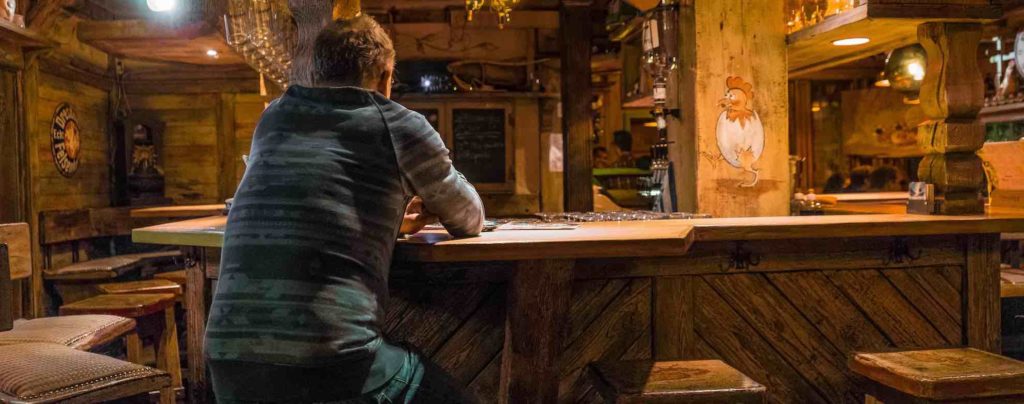
Several years ago, a good friend of mine died from brain cancer. It was the first time I had to deal with the death of someone I was close to who was the same age as I am. At that time, I wouldn’t say I was a Thanatist, but at the same time I felt strongly about the dignity of accepting death for what it is. I really wanted to help my friend accept his own death, so he could end his existence as a fully aware human. Going through the experience of his dying proved just how personal death is though.
His decline was precipitous. One day he was just complaining about some fuzziness in his vision, the next thing I knew he was scheduled to go in for a biopsy. A few days before his biopsy, he and I were at a birthday party for his one-year-old son. It was pandemonium as all kids’ birthdays are, so I convinced him (against his protests) and another friend of ours (who required no persuasion) to escape and go out for a drink.
We found a nice bar nearby that was sunny and bright. I think we were drinking tequila on the rocks. We just kind of sat together at the bar looking out onto the beautiful sunny afternoon. We didn’t talk about his appointment. We didn’t talk much at all. Mostly we just sat and existed together. I think we were all feeling the weight of the moment in our own way, but that didn’t need to be said. Just being together felt right.
The next time I saw him was in the hospital after his biopsy. We were alone together in the hospital room, and the tone was much changed. The biopsy had a hugely deleterious effect on him. He was unsteady on his legs. He was weak. He looked like a broken, older man. He was also terrified.
I told him that I thought a lot about death and dying and that if he wanted someone to talk to I was there. I think he barely heard me though and certainly didn’t understand what I was saying. He kept talking about how he didn’t want his kids to see him so sick. He talked about another friend who was looking into alternative treatments. He talked about how he had to beat this thing.
It was clear even then that he wasn’t going to beat anything though. He was dying. The last thing that he wanted at that moment, however, was to “get real” with death. Just the opposite. He was running hard from what was becoming increasingly obvious. What he wanted was full-on denial. It was clear that the terror he was feeling, which would seem to be a clear realization of what was happening, made him all the less willing to confront its reality. What was even clearer was that it was his choice and there was no way I was going to do anything that made it any realer for him. It seemed like he was experiencing about all the real he could handle.
I saw him a couple of times after that, but his condition was declining rapidly enough that I never felt like I was really with him during those times. I don’t know how his attitude toward his condition evolved as he got closer to death. I don’t know how he felt. I don’t know to what degree he concentrated on how his death would affect his family or whether he thought about himself. I don’t know if he thought he was going to a better place or if he believed this was the end. Before I knew it, he was already gone.
His funeral was a beautiful affair. He was loved by a lot of people and given that he was the first of any of our friends to die, it was well attended. After the service, there was a huge dinner on the rooftop of a nearby club. The crowd was filled with some family, but many more friends–people he knew in the city, friends from business school, and friends from college.
At one point people began to get up to the microphone to talk about their relationship with him. It was really nice. His wife and his sister spoke about how they would miss him and what a great father and family member he was. His fraternity brothers busted on him just like they did when they knew him back in college. His family and friends obviously loved him a great deal.
Throughout that portion of the dinner though, I felt a tension that I couldn’t fully understand. Part of me wanted to get up and say something, but there was an even bigger part of me that definitely didn’t. There was something about the festivities that was making me angry. I felt like something was being left unsaid. It wasn’t until close to the end of the dinner that I realized what was missing and what I wanted to say.
There had been many people talking about the tragedy of my friend’s death. They talked about the tragedy for his wife. They talked about the tragedy of his two young children growing up without a father. They talked about the tragedy for his parents, who were devastated. The one thing they didn’t talk about though, and the thing that I realized I wanted to say, was that in spite of how horrible his death was for his friends and family, the real tragedy was for him. He was the one who would never know his children. He was the one who had spent thirty-five years building up a person, only to have it all taken away from him in his prime. He was the one who would never experience anything ever again.
And that’s what I mean when I say that death is personal. You can be surrounded by friends and family, but the only one who ends at your death is you. This helps us understand another aspect of our denial of death. It’s not so much that we deny death. We can talk about death as it relates to an anonymous soldier. We can understand the death even of a loved one. What we can’t fully comprehend though, what really drives us to our knees, is our death.
